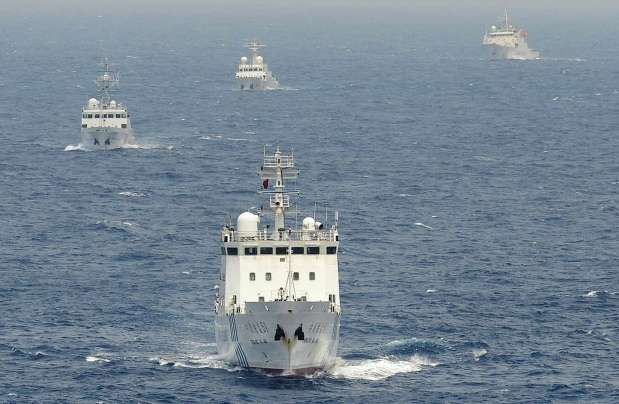Hard power: ‘That’s a knife!’
Posted By Peter Jennings on May 27, 2014 @ 06:00
 [1]2014 is the year hard power re-emerged as the driving force in international affairs. Hard power is the actual or threatened use of military force to achieve national objectives. It’s an ugly thing, supposedly a relic of an uglier past abandoned by modern states in favour of diplomacy. But after Ukraine, Syria, the Senkakus and the South China Sea, can anyone doubt that the supposed rise of the post-modern peaceful state is an illusion? Hard power is back—indeed, it never really went away. So how should we deal with that reality?
[1]2014 is the year hard power re-emerged as the driving force in international affairs. Hard power is the actual or threatened use of military force to achieve national objectives. It’s an ugly thing, supposedly a relic of an uglier past abandoned by modern states in favour of diplomacy. But after Ukraine, Syria, the Senkakus and the South China Sea, can anyone doubt that the supposed rise of the post-modern peaceful state is an illusion? Hard power is back—indeed, it never really went away. So how should we deal with that reality?
Russia’s open military annexation of Crimea and barely-disguised subversion of Kiev’s authority in Ukraine’s eastern provinces constitute a show of hard power as naked as Hitler’s march into the Sudetenland. On the pretext of protecting ethnic Germans in Czechoslovakia’s northern and western regions, the Wehrmacht occupied the Sudetenland in 1938. Hitler’s domestic status grew; Chamberlain and Europe appeased; America avoided entanglement; hard power won. The comparison with Putin’s behaviour in 2014 is irresistible. Russia will pursue its strategic objectives unconcerned about how badly that pursuit plays in the New York Times, or the Hague. Thus far, Putin must be amazed at the low price imposed on his achievements. Token sanctions amount to nothing when Western slaps-on-the-wrist are countered by massive energy deals with China.
In the Middle East there’s no more fearsome demonstration of hard power than the Syrian regime’s use of all possible measures to stay in control. Assad is a man who knows that losing power condemns him to a personal fate like Libya’s Gaddafi’s—dragged from hiding in a drainage pipe to be beaten to death. Until that moment, Assad’s regime will use helicopters to drop barrels packed with high explosives onto civilian targets. Hard power doesn’t need sophisticated weapons, just determination. In the face of such behaviour, American policy shows the ineptitude of soft power when confronted by sheer ruthlessness. Poised for a military strike in September last year after Assad’s chemical-weapons attack on his own people, America hesitated, then opted for a Russian-inspired plan for Syria to surrender chemical weapons [2]. What seemed likely then is embarrassingly stark now: while Assad handed over some weapons it’s impossible to verify full disarmament. In the interim he’s pandered to the West’s cherished norms of soft-power arms control and consolidated his grip by using simpler ways to slaughter his enemies.
There’s nothing Russia or Syria can teach China about the centrality of hard power to political control. Mao wrote in his Little Red Book: ‘Every Communist must grasp the truth: Political power grows out of the barrel of a gun’. Putin’s actions in Ukraine, though, must reinforce the value of the Great Helmsman’s message in current thinking. From the Senkakus in the north down to the very farthest reaches of the nine-dashed-line, China’s actions in 2014 point to a country determined to assert its maritime sovereignty claims by exercising hard power. Beijing has moved from the passivity of ‘peaceful rise’ rhetoric, through the more assertive diplomacy of 2010 to now, where hard-power behavior at sea and in the air simply asserts China’s control. Weaker neighbours will protest, the international community may object to unilateral announcements of Air Defence Identification Zones, but those count for nothing against the reality of extending practical control over contested areas. Hard power wins.
Around the world, from Harare to Pyongyang, from Tehran to Timbuktu, nasty tin-pot dictatorships and aspirant insurgents will draw comfort from the resurgence of hard power. A clear lesson from the last few years is that getting and using power is the best guarantee against foreign interference. That can’t be a welcome development for President Barack Obama, a former editor of the Harvard Law Review, whose cool intellect seems pained by the increasingly thuggish nature of global politics. Nor are the times fruitful for Secretary of State John Kerry when, despite several months of personal effort, it appears Israel and the Palestinian Authority are no closer to a peace settlement. America’s challenge is immense: it must reconstitute a tired military and shake off its aversion to being dragged into conflicts at precisely the moment the rest of the rest of the world rediscovers the blunt-edged value of force.
What does the re-emergence of hard power mean for Australia? First, there’s no post-Afghanistan peace dividend to be harvested. Second, the Asia-Pacific is a rough neighbourhood. Third, military strength is a prerequisite for being taken seriously in that neighbourhood. Fourth, regional security cooperation is a noble aspiration, and we should pursue it with serious intent, but we shouldn’t imagine it’s the only possible future. Finally, maintaining hard power capabilities shouldn’t be a cause of embarrassment. Military strength may seem old-fashioned, but it underpins the internationalist niceness Australia also brings to the table. Remember Mick Dundee: ‘That’s a knife!’
Peter Jennings is executive director of ASPI. Image courtesy of Flickr user Times Asi [3].
Article printed from The Strategist: https://www.aspistrategist.org.au
URL to article: https://www.aspistrategist.org.au/hard-power-thats-a-knife/
URLs in this post:
[1] Image: http://www.aspistrategist.org.au/wp-content/uploads/2014/05/Chinese-surveillance-ships.jpg
[2] for Syria to surrender chemical weapons: http://www.aspistrategist.org.au/syria-thinking-twice/
[3] Times Asi: https://www.flickr.com/photos/94141246@N05/8706415859/
Click here to print.